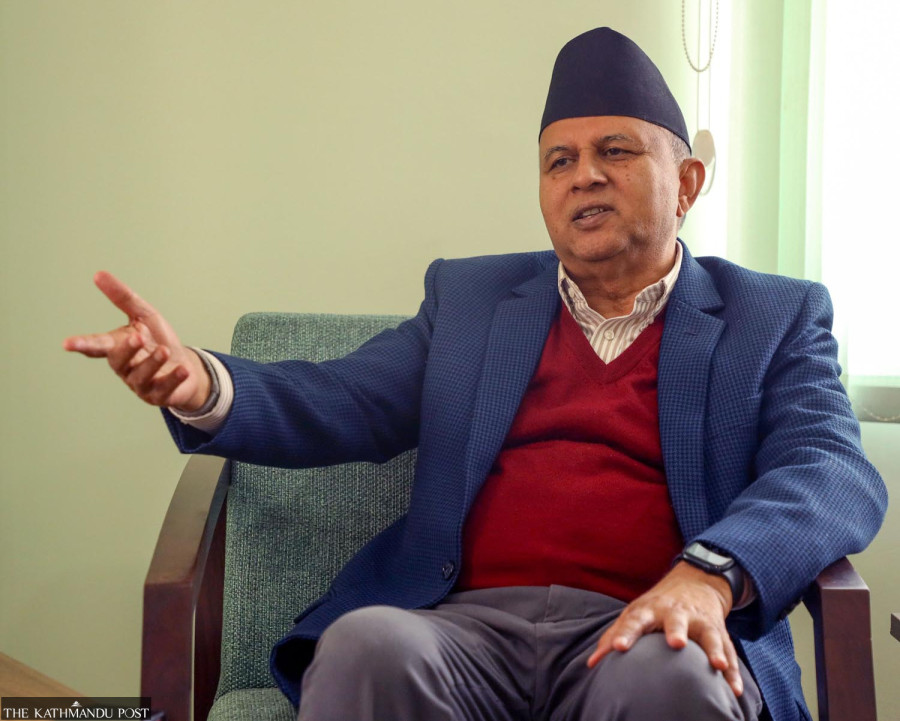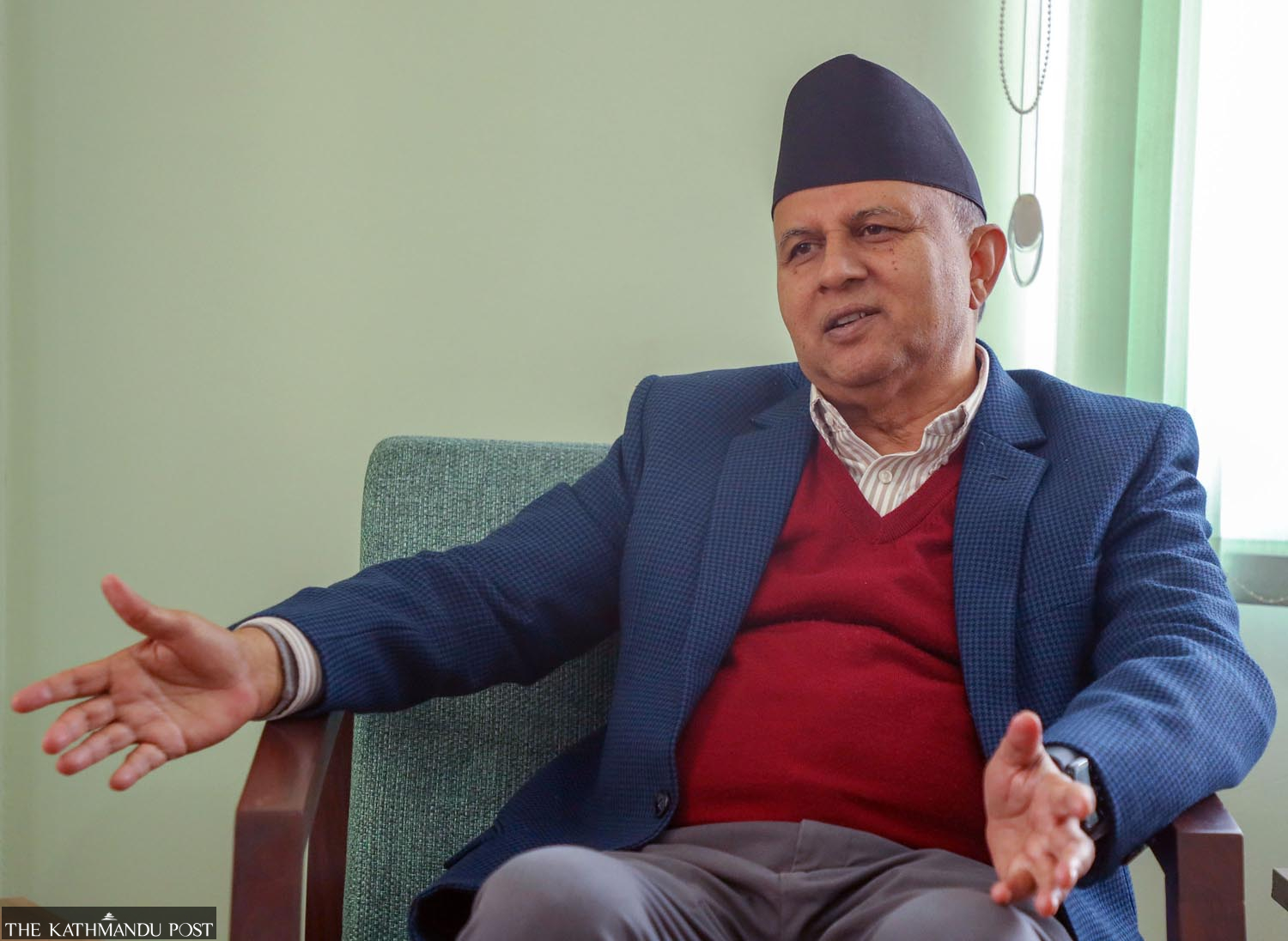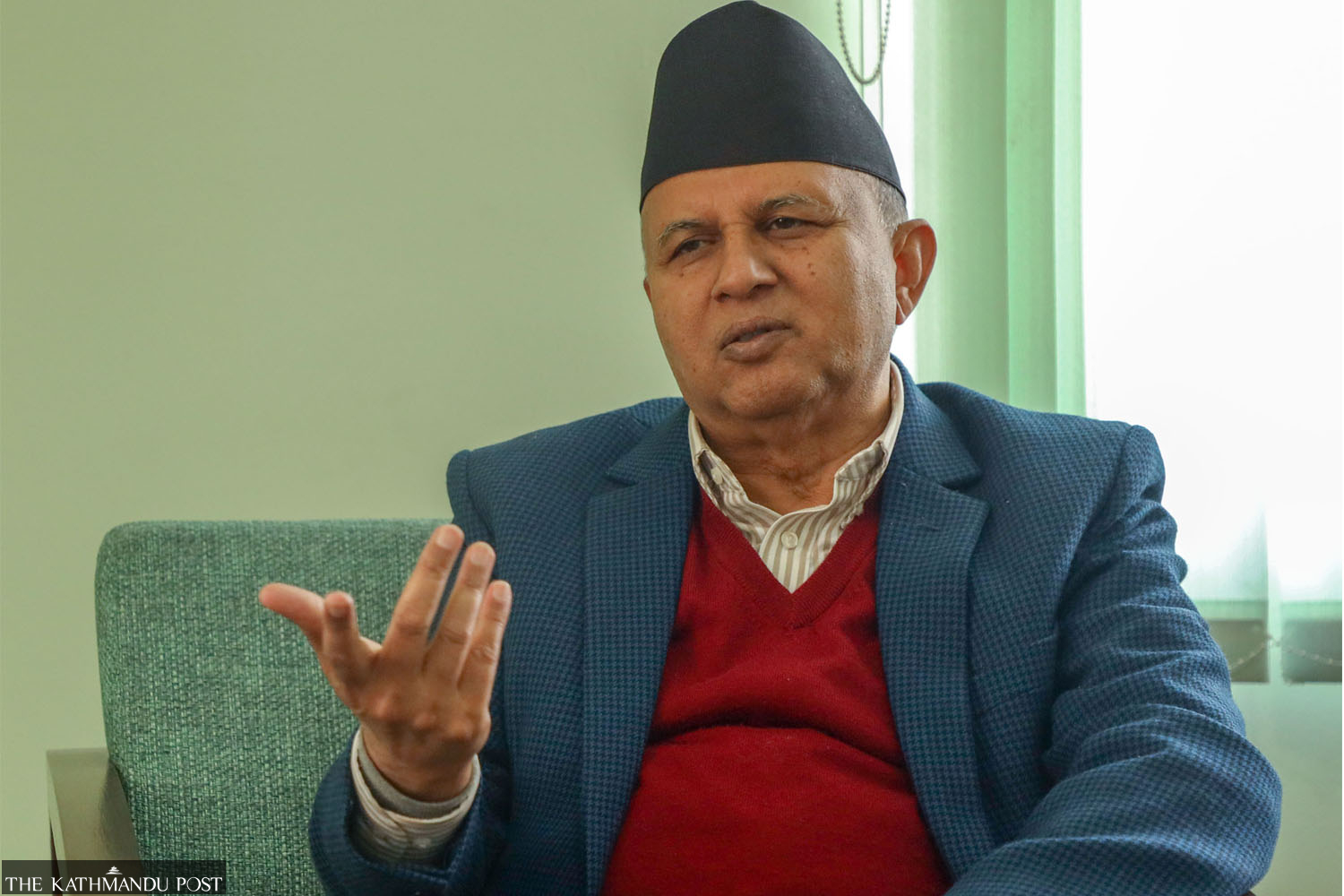Interviews
We are not for left-right polarisation
UML wanted to show that it is not too obsessed with exploiting power turn by turn. Power is not our priority.
Thira Lal Bhusal
Over the past week, the country has seen dramatic political changes. Prime Minister Pushpa Kamal Dahal suddenly broke his alliance with the Nepali Congress and formed a new one with the CPN-UML and other parties. What were the factors that brought together Dahal, CPN-UML chair KP Sharma Oli, CPN (Unified Socialist) chair Madhav Kumar Nepal and others? And what was wrong with the old alliance? Thira Lal Bhusal of the Post sat down with UML General Secretary Shankar Pokharel, who is one of Oli’s confidants and also among the key negotiators during the formation of the new coalition.
What was the decisive factor behind the coming together of the CPN-UML and the Maoist Centre again?
There were two main factors. We were concentrating mainly in preparing the UML for the next general election and conducting party activities accordingly. But the situation in the country kept deteriorating. We started thinking that no reform or progress was possible under the Congress-Maoist-led coalition. People didn’t take it only as a failure of the government and the ruling coalition of the day. We thought the growing frustration may pose a challenge to the system as well. Activities of communal, regional and sectarian extremists were increasing, creating a ground for social anarchy. That made us think differently. We concluded that it wouldn’t be prudent to stay an onlooker. As a responsible party, we decided to come forward, to solve the country’s problems and instil hope in the people. On the other hand, mistrust was growing between ruling coalition partners, mainly the Congress and the Maoist Centre.
The UML often raises political stability as its agenda but how can frequent making and breaking of coalitions give stability? And how can it instil hope in the people?
One has to see whether it is a coalition for positive changes or to serve a negative purpose. We formed a coalition after the 2023 elections comprising the UML, the Rastriya Swatantra Party and the Rastriya Prajatantra Party, among others, under the leadership of Pushpa Kamal Dahal Prachanda. The coalition had a spirit ‘to do something’. But Prachanda ji couldn’t stick to that coalition. He changed partners. But later, he announced that he couldn’t deliver during his previous two terms as per his expectation and that he wanted to prove himself by doing something memorable in this third stint. His main coalition partner didn’t have that spirit. Their main focus was to stay in power for long.
The prime minister, in his address to the nation at the completion of his year in office, admitted that his government couldn’t perform as per his own expectations. That announcement hinted that he had started to realise and review about it. There was no problem in giving continuity to his government as the Congress and other parties were with him. But he wasn’t happy with the partners. Thus, we now find a significant difference in his perspective, compared to a year ago.
How is this coalition different from the previous one and how can it deliver?
This coalition has the backing of the UML that always gives top priority to development and prosperity. And, the Rastriya Swatantra Party, which represents the sentiment that the old political forces couldn’t deliver, is also in this alliance. This combination can yield a good result. On the other hand, strong government leadership can better protect national interests and work in the country’s favour in international dealings. The leadership that has lost its confidence due to failures on the domestic front can’t ensure better results in international dealings.
The UML joined the government without any major portfolios. Some have interpreted this as the party’s desperation to get to power?
No, it should be understood the other way round. If we were in it solely to enjoy power, we would have bargained for more powerful ministries. This time, we decided to join the government realising our responsibility towards the country. We came forward to give an alternative to the nation and we didn’t want to bargain for powerful ministries. We decided to break the gherabandi (encirclement) against us. Second, we wanted to show magnanimity towards other coalition partners while forging long-term alliance by avoiding conflict among the allies.
The eight-point agreement signed by the coalition partners is mum on government leadership. What is the understanding?
We want to prove wrong that we are too obsessed with exploiting power turn by turn. We wanted to give a message that power isn’t our priority. Development and prosperity are. The leadership issue however can be discussed once the time is ripe.
Some Maoist leaders said the new alliance was forged with a long-term plan of left unity. Is it so?
That’s not true. The power equation in the Parliament at present isn’t favourable for that. If left political parties forge an alliance that will provoke rightist forces to make another bloc. That will push the country towards sharp polarisation. We shouldn’t create a situation of pro-left and anti-left. Those who share common ideas on development and good governance should join hands to ensure prosperity in the country. We also included another left party, the CPN (Unified Socialist), as we realised that it can have an important role mainly in forming provincial governments. Running provincial governments smoothly is as important. If relations between all left forces improve during the course of working in the same alliance, that may create a situation of left unity in the long run. But it’s not our immediate plan.

When the UML and the Maoist leaders join hands, people immediately recall the three years, when two parties unified. That time is recalled as a time of communist quarrels. Have the leaders reached any understanding on how to avoid similar failures this time around?
We concluded that it wouldn’t be prudent to always dig up the past and point to each other’s mistakes. The tendency will only create hindrances in collaboration. If we want to run the country, we should think more about the future than the past. Therefore, we wanted to be futuristic.
The leaders are the same and the situation is similar. Why would people believe they won’t repeat past mistakes?
The situation is a bit different. The past disputes you mentioned took place when the top leaders were in the same party and it was a story of complex intra-party struggle. Now they have joined a coalition as leaders of their own independent parties. So they are now more independent in working and making decisions as they aren’t in the complex situation of intra-party struggle. So, such problems won’t arise this time around.
You have worked closely with top communist leaders. Do you see any realisation and readiness on their part to correct past mistakes?
They have realised it. Otherwise, they wouldn’t have been ready to join hands again. But it doesn’t mean that they have already reached understanding on all the issues where they differed. They have their own stances. But at the same time they have also realised that “our differing stances have made us weaker”. That realisation made them ready for collaboration.
A section of society argues that two largest parties—the Congress and the UML—need to run the government to pull the country out from the morass of multiple problems. Is it possible?
We had floated that idea immediately after the 2023 general elections as none of the parties secured a majority. We had expressed our willingness to form a strong government both with the Congress and the Maoist Centre. But Congress leaders weren’t ready for that. Only then did we support the Maoist Centre. But Prachanda ji again chose Congress. Over time, we saw the Congress-Maoist coalition wouldn’t deliver. Congress leaders never felt the urgency to reform. In Congress, we found zero sensitivity towards the situation even as various elements were trying to describe the government’s failure in delivery as the failure of the democratic system. We found the Maoist leaders more sensible to the problem.
Do you mean Prime Minister Dahal was trying to do something but wasn’t getting support from the coalition partners?
In the prime minister, I see restlessness and serious realisation of failing to do something in the past year. He has expressed the same in detail in his recent Parliament address. He realised that he could deliver and instil hope in the people only by collaborating with the UML. We have to see how things work in the days to come.
So you don’t see chances of a Congress-UML alliance anytime soon?
In general, major political forces work together only if there is a threat to democratic system and national sovereignty. But when it comes to regular governance they mostly work separately. In Nepali politics, the Congress and the UML are two major forces that lead two different ideological lines. They should be able to bring together other like-minded forces in their respective orbits as satellite forces. That should be based on ideology. The Congress has accepted the socialism-oriented system only because it is mentioned in the constitution, the party mainly stands for liberal system.

The polarisation in Nepal is between liberalism and socialism. This is inevitable for the two sides taking their respective sides. The most beautiful aspect of democratic system is ideology-based polarisation. It happens worldwide. In the United States, the Democrats and Republicans represent two different ideologically-aligned sections. In Britain, Conservative Party and Labour Party and in India the Bharatiya Janata Party and Congress represent two ideologies. If we want to take Nepal’s parliamentary democracy on the right track, we should have healthy competition between the two competitive ideology-based parties. So, the UML and Congress will forge an alliance only if there is a threat to the system.
Some groups have stepped up their campaigns with the agenda of reinstating Hindu kingdom. How do you see this development?
These are the activities aimed at sowing instability in the country. The extremist activities run in the name of ethnicity and religions in Nepal are part of global power conflicts. They shouldn’t be taken only as domestic issues. As the change in the world power balance has created ripples across the globe, it is more pivotal in Asia. After the fall of the Soviet Union, the world was under the dominance of Western forces. After the Cold War, there was a new trend. Those who adopted mixed economic systems performed better. For instance, China, India, South Africa, Brazil and Vietnam performed well.
China and India benefited the most from this phenomenon. That made western forces worried about their future. Then, they formulated a policy to stop world power from shifting to Asia. Therefore, they stopped India and China from strengthening their bilateral relations. Its side effects are often seen here. As Nepal is situated between two rising forces, they want to use Nepali territory for strategic interests. The extremist activities you mentioned are results of the same international phenomenon. We don’t think these activities pose a serious threat to the system but they can destabilise and cause confusion in the society.
Our federal system and mainly the provincial structure has been severely criticised, citing its failure to deliver. What do you say?
I was the chief minister of Lumbini Province in the initial years of federalism. I set a record by making 100 percent capital expenditure in the third year of my tenure. My government distributed 40,000 water taps in a single year. We blacktopped 200km roads in a year. As long as I was chief minister, the capital expenditure of the province was always higher than the recurrent expenditures. Thus it is wrong to say provinces can’t deliver. But now the government in Lumbini is the weakest among the provinces. So, it depends on the leadership. There is no point in blaming the system. If the US can become powerful under the federal system, if Switzerland can be a model country and India can rise under this system, why can’t Nepal progress under the same system?
But the RSP, a partner in this coalition, is very critical of the provincial layer of the federal system?
The eight-point agreement signed by the leaders of coalition partners [including the RSP chair Rabi Lamichhane], has clearly vowed to strengthen the federal system and the constitution. So, there is no point in individual statements given by RSP leaders. In the last general election, they didn’t contest for provincial seats as they hadn’t registered their newly formed party in provinces. And, they didn’t get their electoral symbols in provinces. They fought only for federal seats due to technical reasons. I don’t think they have challenged the present system and the constitution.
What is your observation on the rise of new forces?
Any political force should be based on its clear ideological ground. Those who grow by just cashing in on public frustration rise quickly and disappear as fast. But we have to admit that their rise has indicated that people aren’t happy. So we have to take it as a lesson and work to strengthen our relationship with the people. Sensing the same, the UML launched the ‘mission grassroots campaign’ and later completed the weeks-long mid-hill highway journey led by our party chair.




 9.83°C Kathmandu
9.83°C Kathmandu












